Savitribai Phule was a trailblazer who opposed repressive social standards in her fight for women’s rights, equality, and justice. She is officially recognized as India’s first female teacher.
Savitribai, a Mali Dalit woman, was born on January 3, 1831, in Naigaon, Satara District.
She married Jyotirao in 1840 when she was just 9 years old. Jyotirao, popularly known as Mahatma Jyotiba Phule, was one of India’s foremost social reformers and anti-caste activists, and it is reported that he educated her at home before enrolling her at a Pune teacher-training college.
Establishment Of India’s First Girls’ School
In 1948, the Phules opened a girls’ school in Bhidewada, Pune, at a period when access to education was largely reserved for the wealthy and upper classes. At the time, wealthy men and women were also not considered suitable for attending school. This was India’s first girls’ school.
Contributions
- Savitribai Phule founded the Mahila Seva Mandal in 1852 as an organization that promotes women’s rights.
- The Phule family organized a barber’s strike in 1860 to protest the shaving of widowed women’s hair.
- The Balhatya Pratibandhak Griha, also known as the “Home for the Prevention of Infanticide,” was established by Savitribai and Jyotirao for pregnant widows who were subjected to prejudice.
- Among other social issues, Savitribai Phule supported inter-caste marriages, widow remarriage, the abolition of child marriage, sati, and dowry systems.
- The Phules founded the Satyashodhak Samaj (‘Truth-seekers’ association’) in 1873 with the express purpose of promoting social fairness. This forum is available to everyone, regardless of caste, religion, or class hierarchies.








